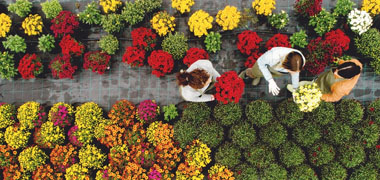
This role has a low level of AI exposure. Core skills such as adaptability, social intelligence, and complex physical tasks remain beyond the capabilities of current AI.
Explore all careersA Station Hand performs daily tasks on agricultural properties, which may include mustering livestock, fixing fences, and operating machinery.
Get qualified to work as a Station Hand with a course recognised across Australia. Speak to a training provider to learn more.











In Australia, a full time Station Hand generally earns $1,200 per week ($62,400 annual salary) before tax. This is a median figure for full-time employees and should be considered a guide only. As you gain more experience you can expect a potentially higher salary than people who are new to the industry.
 Courses.com.au Team
Courses.com.au Team
There are about 31,500 people working as livestock farm workers in Australia, but many of these will be working on smaller farms rather than large cattle or sheep stations. The number of people working in this industry is expected to increase slightly over the next five years. Station Hands will need to travel to remote areas of Australia to find work.
Source: The Labour Market Information Portal – 2019 Occupation Projections
 Courses.com.au Team
Courses.com.au Team
A Certificate II or III in Agriculture is a good qualification to consider if you’re thinking about becoming a Station Hand. You could also do a Certificate III in Rural Operations. The length of the course will vary, but will involve both theory and practical work.
 Courses.com.au Team
Courses.com.au Team
Browse occupations related to Station Hand



If you're looking to start a career as a Station Hand, Whyalla offers various educational opportunities that are tailored to assist you in gaining the necessary skills and qualifications. The Station Hand courses in Whyalla are specifically designed for beginners, making them perfect for those with no prior experience in the field. With a total of 11 available courses, aspiring Station Hands can easily find the right training to suit their needs.
Among the most popular choices is the Certificate II in Agriculture AHC20122, which provides a foundational understanding of agricultural practices. The Certificate III in Agriculture AHC30122 builds upon this knowledge, refining your practical skills and enhancing employability in the agricultural sector. Both of these courses are excellent starting points for anyone keen on forging a successful career in the Station Hand role.
Additionally, specialised courses such as the Apply Poison Baits for Vertebrate Pest Control in Rural and Environmental Landscapes AHCPMG312 and the Course in Minimising Risks in the Use of 1080 & PAPP Bait Products for Vertebrate Pest Control 22516VIC provide essential skills for managing wildlife and pest control effectively. These courses are crucial as pest management is an integral part of station operations in the Whyalla region and contributes significantly to maintaining the health of agricultural landscapes.
For those interested in workplace safety, the Contribute to Workplace Health and Safety Processes AHCWHS302 course equips learners with the skills necessary to ensure a safe working environment. Furthermore, the Certificate III in Dairy Production AHC30221 and the Certificate II in Shearing AHC21316 also stand out as noteworthy qualifications for those looking to excel in specific fields such as dairy and sheep shearing, both vital industries in the Whyalla area.
Overall, the Station Hand courses in Whyalla encompass a comprehensive range of training options, providing learners with essential skills that lead directly to job opportunities in agriculture. By exploring these programs, not only can you gain qualifications in Agriculture courses and Livestock and Animal Production, but you can also take the first step towards a rewarding career in this vital sector. Don't miss out on the chance to receive quality training in the scenic surroundings of Whyalla, where agriculture thrives.